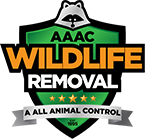Geese 101- What you need to know
If you are reading this, you already know that Geese can be a nuisance on your property. What you may not know is there are rules and laws that dictate how and when they can be removed. The best advice is to call a professional.
Geese Facts
There was a time when the Canada Goose was almost extinct due to excessive hunting. Since 1962 these birds have been protected by the Migratory Bird Treaty Act. This means they can not be hunted, killed or taken or even sold without permission. This Federal Law has caused the population to come back in a big way. Some of these birds migrate and the non-migratory ones prefer to stay in one area . It is easier for them to stay in areas where they are not threatened by predators. Well populated areas like suburbs, golf courses, parks and neighborhoods are great locations. Not only are they free of dangerous predators but there can be food and bodies of water on them as well.
Mating season for the geese begins in late winter or early spring. Anytime between February and March. They like to go to the same mating spot each year if possible and they tend to stay there to nest. Nesting will last throughout spring, ending anywhere from late March until May. It is illegal to move the eggs or nests, in fact, this is the time nothing can be done to drive them away. During this time, goslings hatch and parents make sure they are safe from predators and fed well. They lay an average of five eggs per year but can lay as many as nine. This usually takes place near water. It is important to know that geese can be extremely aggressive when protecting their young, even hissing and charging at people if they feel threatened. By late June to Early August, the goslings will have matured and the geese begin the molting season. At this point, they lose their flight feathers and new ones begin to grow. This is the point where they can’t leave your property because they can’t fly. For the rest of the year they will forage and fly to other locations to look around. Other lakes or ponds or even fields.
One of the worst things about having geese on your property is the droppings. Goose droppings are not only unsightly and foul, they are harmful to land and water. Each adult goose can deposit between one pound to one and a half pounds of fecal matter every day. That amount can add up quickly when you consider the number of geese present. The droppings are filled with bacteria that are harmful to humans like Salmonella and E coli. Just one more reason to want these birds driven off your property. Remember, laws prevent you from disrupting nests or harming the geese. Please contact our office for assistance.
